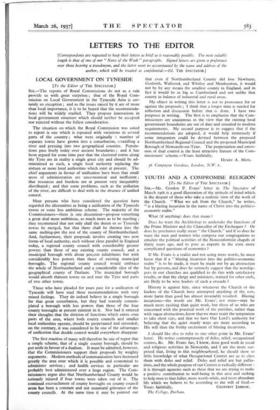YOUTH AND A COMPROMISE RELIGION
[To the Editor of THE SPECTATOR.] SIR,—Mr. Gordon P. Evans' letter in The Spectator of March 19th is a good illustration of the attitude of mind which is the despair of those who take a realistic view of the work of the Church. " What we ask from the Church," he writes, " is a blazing incursion in the name of Christ into the politico- economic realm."
What (if anything) does that mean ?
Does he want the Archbishop to undertake the functions of the Prime Minister and the Chancellor of the Exchequer ? Or does he perchance really mean " the Church," and if so does he want the men and women who compose our congregations to emulate the political activities of the Nonconformist chapels of thirty years ago, and to pose as experts in the even more complicated questions of economics ?
If Mr. Evans is a realist and not using mere words, he must know that if a " blazing incursion into the politico-economic realm " is to be made, it must be made not by an abstraction but by persons, and does he seriously suggest that the worship- pers in our churches are qualified to do this with satisfactory results, or that the clergy and ministers, trained for other ends, are likely to be wise leaders of such a crusade ?
History is against him, since whenever the Church or the leaders of the Church have attempted anything of the sort, more harm than good has almost invariably resulted. Blazing incursions—the words are Mr. Evans', not mine—may be much more exciting than quiet work, but those of us who are concerned with the practical work of the parishes, rather than with vague abstractions, know that we must resist the temptation to take short cuts, and that we have Our Lord's authority for believing that the quiet steady ways are more according to His will than the frothy excitement of blazing incursions.
I should like also to refer to one other point in Mr. Evans' letter. He writes contemptuously of doles, relief, occupational centres, &c. Mr. Evans has, I know, done good work in social and religious activities in Newcastle, and I am the more sur- prised that, living in this neighbourhood, he should show so little knowledge of what Occupational Centres are as to class them with doles and relief. Doles and relief are but pallia- tives, and the whole purpose of our Centres is radically different : it is through agencies such as these that we are trying to make a positive contribution to well-being in this area and seeking to help men to that fuller, more worth-while, and more abundant life which we believe to be according to the will of God.—










































 Previous page
Previous page